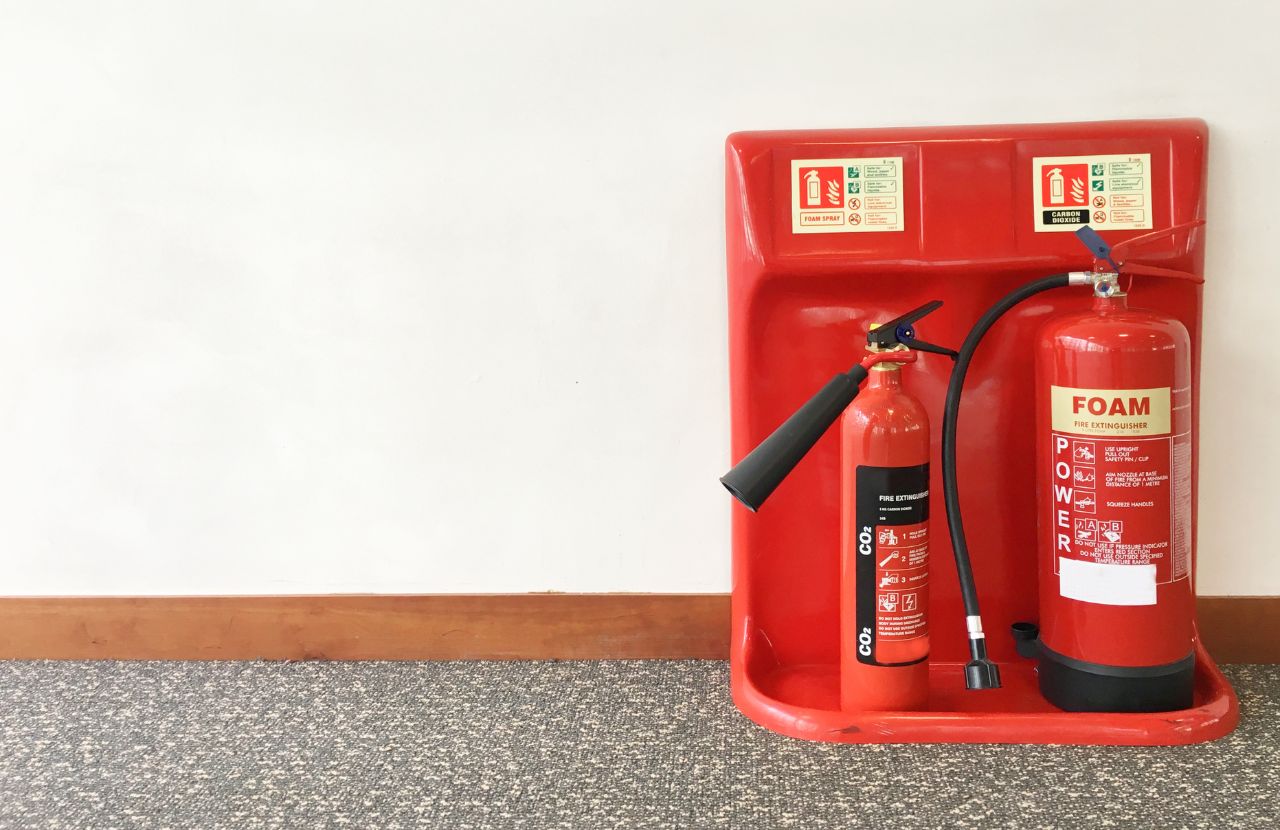
In the UK every year there are approximately 22,000 workplace fires which underscores the importance of appointing competent fire marshals. Fire marshals have a pivotal role in preventing fires, managing safe evacuation in the event of a fire, and ensuring a business complies with the law.
Here we share everything you need to know about the role of a fire marshal (or fire warden) and their responsibilities in the workplace.
Who is responsible for workplace fire safety?
Under the Regulatory Reform (Fire Safety) Order 2005 (RRFSO), responsibility for overall workplace fire safety lies with the ‘responsible person’.
If the premises is a workplace, the responsible person is the employer. If it is not a workplace, then the responsible person is:
- The person who has control of the premises (as occupier or otherwise) because they carry on business, trade or another undertaking at the premises (for profit or not); or
- The owner of the premises, where the person in control of the premises does not have control in connection with the carrying on a trade, business, or other undertaking.
Article 18 of the Order states that the responsible person “must appoint one or more competent persons to assist him in undertaking the preventive and protective measures.” A fire marshal is a competent person appointed by the responsible person.
Article 18 also states, “the responsible person cannot devolve their personal responsibilities to a consultant or employee.”
What are the routine responsibilities of a fire marshal?
All fire marshals have two overarching responsibilities in the event of a fire:
- Ensuring everybody in the building is evacuated safely and quickly.
- Carrying out a visual search to make sure nobody is still in the building.
A fire marshal’s responsibilities will depend on the size of a premises and the nature of the business. Some organisations have dedicated personnel such as workplace services, security, and in-house maintenance teams who take on some of the responsibilities listed here.
Their day-to-day responsibilities may include:
- Carrying out fire drills. Fire marshals often organise and execute fire drills to ensure that all occupants can hear fire alarms, are well-versed in evacuation procedures and familiar with exit routes and assembly points. They evaluate drill effectiveness and make necessary improvements.
- Ensuring a fire drill has taken place in line with the policy.
- Making sure the fire alarm has been tested and can be heard by everyone.
- Making sure fire exits are operational and obstacle-free. This includes opening fire exits to ensure there are no obstructions outside.
- Ensuring fire safety signage is in place so fire exits and escape routes are clearly marked.
- Carrying out frequent, visual checks to make sure fire alarms, fire extinguishers and emergency lighting are in place, working and is serviced.
- Check all emergency lighting has been tested and works.
- Fire alarms, fire extinguishers and emergency lighting is in place and has been serviced within the correct timeframe.
- Promptly reporting any faults or unsafe practices.
- Ensuring new employees are trained to know what to do in the event of a fire.
- Keeping clear records of all fire safety activities carried out.
- Assisting the responsible person with fire risk assessments, the creation of an emergency plan and personal emergency evacuation plans (PEEPs).
- Ensuring electrical items comply with The Electricity at Work Regulations 1989 and testing is up to date. Electrical fires are the most common fires to occur in UK workplaces.
- Making sure fire hazards are identified and reported promptly.
- Ensuring flammable materials are stored safely.
What are a fire marshal’s responsibilities in a fire?
A fire marshal’s actions during a fire are critical to everyone’s safety. When a fire breaks out, panic and fear can make it easy for people to forget their training. A fire marshal must be able to remain calm and take decisive action to protect lives.
Their responsibilities may include:
- Raising the alarm. A fire marshal’s immediate actions in the event of a fire are to make sure people know there is a fire, and to notify the emergency services.
- Making sure fire doors and windows are closed to prevent fire and smoke spreading.
- Assisting vulnerable individuals. Fire marshals should assist individuals nominated to help vulnerable people in the building, such as those with mobility issues or disabilities to evacuate the premises safely. They may follow personal emergency evacuation plans (PEEPs) for these individuals.
- Firefighting. If it is safe to do so, fire marshals may use firefighting equipment, such as fire extinguishers, to help contain a fire and prevent its spread. However, their safety is paramount (see the ‘When can a fire marshal tackle a fire’ below).
- Carrying out a sweep of the building. Fire marshals are responsible for conducting a systematic sweep of a building along the escape routes. They check that all areas, including bathrooms, storage spaces and cupboards are vacated.
- Guiding people to an assembly point. After evacuation, the fire marshal guides people to the designated assembly point and ensure they remain there until further instructions are received.
- Accounting for everyone’s safety. Fire marshals perform a roll call and headcount during the evacuation process.
- Coordinating with emergency responders. Fire marshals must coordinate and communicate with emergency responders, such as the fire brigade or paramedics, providing them with vital information about the fire’s location and type.
A fire marshal’s primary responsibility is to facilitate the safe and orderly evacuation of all individuals from a building during a fire and to conduct thorough checks to ensure no one is left behind.
When can a fire marshal tackle a fire?
A fire marshal must only tackle a fire if it is smaller than a wastepaper bin, and only when everyone has been evacuated from the area.
They must never tackle a fire that has started to spread, and when smoke is going to block their escape route.
Who can be a fire marshal?
Anyone can be a fire marshal at any level in an organisation as long as they are over 16 years old and ‘competent’.
Article 18 of the Regulatory Reform (Fire Safety) Order 2005 defines a competent person as someone with “sufficient training and experience or knowledge and other qualities to enable him to properly assist in undertaking the preventive and protective measures.” “The level of necessary competence will vary according to the nature and complexity of the premises.” (Regulatory Reform (Fire Safety) Order 2005: Guidance Note 1: Enforcement, Section 89)
The Fire Safety (Employees Capabilities) (England) Regulations 2010 says, “Every employer must, in entrusting tasks to employees, take into account their capabilities as regards health and safety, so far as those capabilities relate to fire.” Note that this regulation only applies in England.
When appointing a fire marshal, there are a few key considerations that will help in the selection of a suitable person. The ideal candidate for a fire marshal position should be confident, organised, able to remain calm in stressful situations and have excellent communication skills. Multiple fire marshals may be required depending on several factors, including the square footage of the workspace and the number of people on the premises.
What training do fire marshals require?
Fire marshals have a vital role in keeping workplaces safe and so they require comprehensive training. They should take specific training for the role, which should be refreshed as necessary and in line with company policy to keep skills fresh and up to date, especially considering regulatory changes.
Regulatory Reform (Fire Safety) Order 2005, Guidance Note 1: Enforcement 18 (section 89) states that basic training and a reasonable knowledge of a premises may be sufficient for “micro, small and medium sized premises”, but where premises are “higher risk, large or complex a higher level of competence is likely to be necessary”.
Praxis42’s IOSH Approved Fire Marshal Training is a comprehensive training course that assists with complying with the Regulatory Reform (Fire Safety) Order 2005. The course can be completed at the trainee’s own pace, with no previous or specialist knowledge required.
Training covers:
- Arson. Understanding the intentional setting of fires and strategies for preventing and addressing arson incidents.
- How fires start and spread.
- Main causes of workplace fires and fire safety precautions. Identifying common causes of fires, such as electrical faults, cooking accidents and flammable materials.
- Fire statistics. Analysing data on the frequency and causes of fires in a specific area or context. Identifying trends and patterns to inform fire safety measures.
- Types of fire detection and warning systems. Exploring fire detection technologies such as smoke detectors, heat detectors and fire alarms. Understanding how these systems work and their importance in early fire detection.
- Types of firefighting equipment. Familiarity with firefighting tools and equipment, including fire extinguishers, hoses, and sprinkler systems.
- Operating firefighting equipment. Practical knowledge of how to safely operate and discharge fire extinguishers and other firefighting apparatus. Hands on training in using fire extinguishers.
- Identifying primary and secondary evacuation routes within a building, and understanding the importance of clear, unobstructed pathways.
- A fire marshal’s duties before, during and after a fire, including how to lead evacuations and coordinate with emergency services.
- Implementing a fire emergency plan.
Do fire marshals need refresher training?
Fire marshals must attend periodic refresher training, so they are confident in their skills and knowledge, and are up to date with regulations and best practices. Here are 6 reasons why refresher training is important.
General fire marshal training certificates are valid for 3 years. Fire marshals in high hazard workplaces or buildings, and those in residential care setting and hospitals may be required to refresh their training annually.
